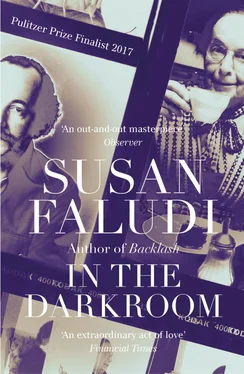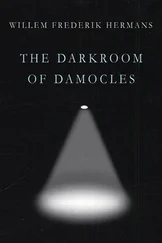“I changed it because I was a Hungarian.” She corrected herself, “Because I am a Hungarian. One hundred percent Hungarian .”
I was someone with only the vaguest idea of what it meant to be a Jew who was nevertheless adamant that I was one. My father was someone reminded at every turn that she was a Jew, who was nevertheless adamant that her identity lay elsewhere.
6

It’s Not Me Anymore
My father stood in the doorway in her favorite crimson bathrobe; she wore it every morning of my first visit. It had a monkish cowl and angel-wing sleeves. She called it “my Little Red Riding Hood outfit.” It wasn’t entirely closed. “What are you doing?”
“I’m”—my voice squeaked; I looked down at the receiver in my hand—“phoning someone.”
“Who?” She eyed me, suspicious.
“Just a friend of a friend,” I said guiltily, though I was telling the truth. “She lives in Pest. She wanted to meet me.”
“There’s no time,” my father said.
“I just—”
“You’re only here another week.”
I set down the receiver. No time? I thought. I’d been here four days, and we’d only left the house once—to pick up her new Web camera at Media Markt. My confinement had me wondering whether my father’s elaborate home security system was meant to keep burglars from invading or guests from escaping. She kept the gate in the security fence locked on both sides. Merely to step outside, I had to ask her for the key. Stefánie’s Schloss was starting to feel more like Dracula’s Castle, and as the days passed, I was acting more and more like the passive captive, a character in one of my father’s treasured fairy tales, Rapunzel in the tower. Why didn’t I finish dialing the phone number? When my father refused to visit her family’s old summer villa a half-block away—a place I was eager to see, having heard about it all my life—why didn’t I just go knock on the door? If she didn’t want to venture out, why didn’t I hike down the hill and catch the bus into town? Instead, I retreated to my room, made resentful cracks under my breath, and attempted furtive phone calls when my father was out of earshot. I was slipping back into that twelve-year-old self, timid and sullen, fearful of Daddy. Who was no longer Daddy.
Yet inside the ramparts my reclusive father seemed determined, even desperate, to come out of hiding, or to bring at least one aspect of herself out for inspection. That first week she’d led me up and down the stairs, unlocking closets and cabinets, modeling outfits, donning makeup, and reciting labels (“Max Factor English Rose Lip Gloss,” “Wet n Wild Cover-All Stick,” “Vogue Self-Adhesive 100%-European-Hair Lashes, Trimmed and Feathered”). She was introducing me to “Stefi,” as she preferred to style herself, displaying the evidence of what she called “my new identity.”
Including and especially the evidence of her new physique. The robe seemed always to be falling open. Or the blouse. Or the nightgown. Every morning, she’d summon me to her room for wardrobe counsel. “Do these shoes go with this purse?” she’d ask, more often than not standing in her underwear. What does it matter , I’d mutter to myself, we’re not going anywhere. Or she would barge into my room on some pretext—“I think I left my stockings in here”—to present her new body in a negligee. Her exhibitions felt more like invasions. She said she was “showing” herself. But as the shows piled up, so did my distrust. What lay behind the curtain of her new transparency?
“This is where I put the things I wore when I first started ‘dressing,’” my father said on the second morning of my visit. We were standing on the third-floor landing, before a large, gray-metal locker. She extracted from her apron pocket a key ring worthy of a prison warden. After a half dozen failed attempts and a lot of rattling, she found the one that opened the creaking door. The locker’s contents might have outfitted a Vegas burlesque show: a sequin-and-beaded magenta evening gown with sweep train, a princess party frock with wedding-cake layers of crinoline, a polka-dotted schoolgirl’s pinafore with matching apron, a pink tulle tutu, a diaphanous cape, a pink feather boa, a peek-a-boo baby-doll nightie with matching ruffled panties, a pair of white lace-up stiletto boots, a Bavarian dirndl, and wigs of various styles and shades—from Brunhilde braids to bleach-blond pageboy to Shirley Temple mop of curls. “Why do you keep this locked?” I asked.
“Waaall … These clothes are more”—she considered—“flamboyant. They are from before the operation. Before I became a laaady. Now I dress sedate.”
Another morning, my father summoned me to the two computers in her attic office. Under the eaves was her image palace. On one wall were two locked doors. The first led to her reconstructed photographic darkroom, which she had had crated and shipped from New York in the summer of 1990. And then never used. The digital age had made my father’s talent for “trick photography” with film and print obsolete. Behind the second door was more photo equipment, including her old and giant photo-print drum dryer. The main room contained still more photographic supplies, several studio lights and jumbo rolls of paper for the advertising shoots she no longer conducted. An aluminum frame to hold backdrops was bolted into the floor.
The floor-to-ceiling shelves that wrapped around the central room held a video library: more than two thousand DVD, VHS, and Beta tapes of Hollywood epics, romantic comedies, Disney animations, TV sitcoms, mountaineering documentaries, and, to my dismay, a full set of Leni Riefenstahl films. (“Okay, she was a Nazi,” my father conceded, “but a greaaat filmmaker!”) She also possessed a vast array of digitized NASA footage—she subscribed to the space agency’s daily e-mailed download—and a cache of flight-simulator games. At her request, I’d arrived with the latest edition of Microsoft’s “takeoffs and landings” video, an unnerving item to be carrying in my hand luggage so soon after 9/11. My father wanted me to buy it in the States to avoid the import tax.
Tucked into the far alcove was my father’s electronic command station. Here she trolled the blogosphere, Photoshopped her images, visited the lunar landscape, and piloted her virtual fighter jets. We fell into a routine the first week, sitting for hours every day in front of a computer monitor, my father at the keyboard, me in a folding chair by her side, reporter’s notebook and tape recorder at the ready. Some mornings she wanted me to see all the cross-dressing Web links she had bookmarked to “My Favorites” in the years leading up to her operation: “Costume Wigs,” “Fantasy Femmes,” “Gender Bender,” “Gender Heaven,” “Just Between Us Special Girls,” “Maid Service,” “Miss Elaine Transformations,” “Mrs. Silks,” “Paper Dolls,” “Petticoated.com,” “Pink Gladiolas,” “Sweet Chastity Online,” “T-Girl Shopping,” “Top Sissy Sites” …
“You can find everything on the Internet!” my father exulted.
The longer we spent in the third-floor garret viewing virtual non-reality, the more frantic I became to escape into the world beyond the perimeter. If I stood at the attic window and stretched on tiptoe, I could just make out, over the chestnut and fruit trees and down the sloping hills and across the river, Pest, that fabled cosmopolis, the historic venue of so much creative and cultural ferment. At the turn of the century, Pest had been host to a spectacular upwelling of artists and writers and musicians whose works had packed the museums and bookstalls and concert halls, who’d painted and scribbled and composed in the six hundred coffeehouses, published in the twenty-two daily newspapers and more than a dozen literary journals, filled the more than sixteen thousand seats of the city’s fast-proliferating theaters and opera and operetta houses, and transformed the identity of the long backward capital into the “Paris of Eastern Europe.” The city in my mind was the one I’d read about in John Lukács’s Budapest 1900 , the one the London Times correspondent Henri de Blowitz described in the late 1890s: “Buda-Pest! The very word names an idea which is big with the future. It is synonymous with restored liberty, unfolding now at each forward step; it is the future opening up before a growing people.” Blowitz’s city, I knew, belonged to a time long past. Still, my mind somehow wanted to hitch the city’s old aspiration to my father’s current one. Even when I was growing up, I’d felt that a key to my father’s enigma must lie in that Emerald City of István Friedman’s birth. I still couldn’t dispel the notion that to understand Stefi, I had to see her in the world where he was from, visit the streets and landmarks and “royal apartment” that little Pista had inhabited. But Pest was down the hill, visible only on tiptoe.
Читать дальше













